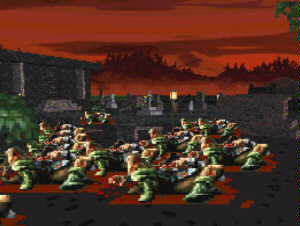Thursday 19 October 2000

|
Pic of the day: I'm happy to say that today's picture is from the role
playing game Daggerfall. Luckily there are no similar scenes here ...
at least for now. Ebola scareI heard on the news today that the Ebola virus was spreading again in Africa, this time in Uganda. It was in the process of reaching a refugee camp, and a famine relief organization was withdrawing its personnel. I think that was a wise decision. Because if the virus hits, the food is likely to last ten times as long - if people stay in the camp at all. Yes, Ebola kills up to 9 out of 10 infected with it. It is also one of the most contagious illnesses known. If it is necessary to sacrifice a few thousand lives to contain it, that is what must be done. Because if it reaches a major city, it can no longer be contained. Not just New York or London, but Cairo, even Harare would probably be enough. With today's jet flights, the virus would spread to all the civilized world in a matter of days. There is no cure against it. 50-90% of people living in cities and towns would die. Among them probably I. Not that you would be likely to know, as human civilization would be wiped out in a matter of days. People living on farms deep in the countryside would mostly not be exposed directly. I'm not sure if the virus remains active long after the victims are dead; probably not, but don't take my word for it. You may want to stick it out on the farm for a few months or years, just in case. It is unlikely that the taxman would come after you. But starving survivors from the city would probably show up eventually, when the canned food runs out. ***We live in a very complex society. We depend on one another in so many small ways. Even if I didn't go to work the day Ebola came to Kristiansand, how long would I survive? I have spaghetti for several weeks, but certainly not enough to last me through the winter. And it is anybody's guess how long even hydropower would continue without maintenance. Probably not many days. My brother the farmer and his family would stand a much better chance. That is, if the virus did not come to the village where their kids go to daycare. I suppose by then it would be obvious enough that people would not send their kids - or themselves - into any major population center. Maintaining a farm without electricity, without diesel, and without grain would be a challenge. But a surmountable challenge. I think they still have an old wood stove lying around. And there would probably be no need to have as many animals, as there would be no bills to pay for a while. ***I wonder how people would react to such a disaster. Most people these days live in cities or towns, and they would for all purposes be doomed. Hearing that the plague was coming, would they flee into the hills? Or go to church? Plunder, pillage and burn? Party like it was the end of the world? Probably some would do one thing, others the opposite. People are different. Always were. Always will be. Survivors without a job, without money (or with worthless money, once government collapsed) and in need of food ... it is not hard to predict that they would swarm the countryside. Even if they did not carry with them the plague (and in the beginning, some probably would) they would still be a plague unto themselves. Some would probably offer their assistance to farmers in exchange for food and lodging. Some would beg. And some would steal, killing or being killed in the process. Law and order would be gone. With no government, people would have to band together as best they could for protection against the robbers (or to rob others). Eventually there would be no more farms to rob: Those not protected would be razed. The robbers would die out, or have to settle on deserted farms and try to make a living. That can be hard if you don't know the first thing about agriculture, and if all food is already stolen. The population would continue to decline for months, possibly years. It is unlikely that more than 1 in 10 would survive the months it would take to grow new crops. By then, we would be down to 1% of the original population. Approximately 60 million people on Earth instead of 6 billion, and most of them would be utterly clueless in the skills they now would need. I don't think that Ebola would mean the end of the human race. On the contrary, it just might save us from destroying the entire planet with our fun atomic playthings. Still, there have to be a better way. It would certainly mean the end of civilization as we know it. The gold and the silver, the copper and the iron and the clay would all be swept away like dust on the wind. How ironic. ***Now this was a worst case scenario. It is entirely possible, but not necessary. Let us hope and pray that it doesn't get that far. As long as Ebola stays in the developing world, it usually kills faster than it spreads, burning out on its own. Only with modern fast transit is it a risk to the world. Perhaps the poorest areas of the world would be spared - the natives in the rain forests and deserts. Now that would be ironic: Almost like the meek inheriting the world. |
Yes, rain today again. |
Yesterday <-- This month --> Tomorrow?
One year ago